S15, E6A: The Hungry Hungry Hippocampi
Series 15: How to Remain Blameless while Calling BS on 'No Free-Will'
I have split Episode 6 into this free portion (A) and a paid counterpart B-Side (S15, E6B: The B-Side /“Trigger Hippie”) - paying subscribers will find it in their email but otherwise you can track it down here to see if it is something you might like to read.
If you are wondering what this A-Side/B-Side split is about, please check out my explainer, here.
Solutions Looking for Problems
I have read or heard many arguments for there being no free-will and found some of them interesting, but to be candid, it was not something I spent much time thinking about. As an engineer I am interested in problems that have a reason to be solved.
So what changed?
‘Determinist’ philosophies are now being widely presented as a practical basis for reengineering society. The primary danger is that young people, already steeped in the idea that we can actively compensate for every type of intersectionality, are exposed to this without a decent counterbalancing argument. I don’t think there is reason to suppose that the consequence of philosophy is always benign.
As you will see when I get to my review of Robert Sapolsky’s latest book “Determined: A Science of Life Without Free Will” in later episodes, my disagreement is less about what he says, and more to do with what he claims it means. After all, I consider myself to be a determinist too, except for me that includes self-determinism.
As with ‘Equity’ it seems to be based on a social justice economics model where perceived advantages and disadvantages are traded. This takes it a step further, because the thing stopping it from being some form of neurological Marxism, is its complete disregard for labour i.e., since anything we do good or bad, has nothing to do with us.
Consequently, if you are inclined to put in effort, tune out distractions and defer gratification to reach your objective, you betray the developmental privilege in your prefrontal cortex. Similarly, if you are a transgressor it is not your fault, you are merely confronting others with the mark of your victimhood.
Imagine if you will, a golf tournament where the players arrive, compare form, declare the winner to be the golfer with the highest handicap, then leave without playing a stroke.
Now it looks like an engineering problem that needs to be solved.
Series Recap and Elaboration
In S15, E1: The Railroaded Children: ‘No Free-Will’, the focus was on logical and linguistic inconsistencies in the no free-will argument. For example, if intentionality is an illusion how can we have the intention to engineer it out? Having free-will is the most parsimonious explanation for our behaviour. It’s free-will that empowers determinists to oppose every natural instinct they have to deny its existence.
In that opening episode I set out three conjectures to underpin my suggestion that environmental factors can all be described in terms of constraints, whether that be what we are immersed in, the biological environments internal to the organism or historic environments that provided us with inherited context.
Here I want to try out another local definition utilising the analogy of the relationship between sedimentary deposits and time.
Local Definition #2 : Sedimentary Environments
A sedimentary environment can be thought of as an environmental layer in time. Each layer provided the evolutionary pressure and influenced the lives of organisms in its own period. Every layer was built upon previous layers and became foundational to those that followed.
When a child acquires self discipline it is by learning how to deliberately apply internal constraints to impulses. Our personal development can be thought of a process of layering, where some characteristics are foundational and built upon to maturity, while others are just simply buried.
Daniel Dennett’s point that free-will is acquired during life through the development of self-discipline is exactly right. Our ability to self-determine increases as the constraints of childhood fall away, because maturity, self regulation and competence permits the scaling back of supervision.
Dynamic environmental influences will always act upon us but the responsibility for navigating them is gradually transferred from external guardianship to our growing endogenous capabilities for decision-making. You can call that programming if you like.
S15, E2: Randomness, Strawmen and Piñatas was a deconstruction of part of a Alex O’Connor podcast where he interviewed Robert Sapolsky about his book ‘Determined’. Sapolsky went along with O’Connor’s point that the opposite of determinism is randomness. This is a common error, even amongst those who are advocating for free-will, and it’s a twofold confusion. First, between ‘uncertain’ and ‘random’ and second, between ‘external’ and ‘self’ determination.
On occasions we all feel uncertain about what to do and perhaps sometimes our decisions feel arbitrary. This is not the signature of a randomising component in our brains but because we are reacting to external uncertainty. I will try to make this point clearer by use of two analogies.
Analogy 1: Random Reflections
Imagine you are playing a dance game where you have to hit the randomly illuminated tiles with your feet. Your movements are unpredictable and may even seem ‘random’ to an observer - but your actions are not random because they are determined by your attempt to mirror whatever sequence is generated.What is not being mirrored is ‘randomness’ because the player is reacting to the certain fact of which panel is lit up in a given moment.
Analogy 2: A Randomised Route to Certainty
Imagine you find yourself dithering over choosing some lottery numbers for the next draw. Perhaps you try to imagine the numbers being called out but by whatever means you are attempting to penetrate the unknowable; the numbers are to be randomly drawn. Because we have the capacity for simulation it is seductive to think we can somehow intuit random events.
On the day of the draw you are waiting to check your numbers as the balls are expelled from the drum. After each ball your uncertainty about the set of winning numbers is reduced until eventually you know them all. Those numbers were randomly selected, but they are not and have never been, random numbers. The transition you just witnessed was from uncertainty to certainty. Might random neural firings change the outcome of a situation as some distinguished physicists suggest? Possibly, but if so, I strongly suspect that such occurrences would be extremely rare. I am sceptical of any idea that requires me to accept that randomness is somehow a necessary ingredient of our routine decision-making process. I don’t know of a convincing argument for that and it’s only awareness of my limitations that prevent me from unequivocally rejecting it.
It was this conflation of uncertainty, unpredictability and randomness in conversations about free-will, that inspired me to write the counterpart episode, S15, E2B: The B-Side/ "Navigating Uncertainty".
I introduced the idea that Conscious Mind (CM) is an observer that forces counterfactual collapse of unconscious options, i.e. by providing the ‘Unconscious Decision Maker’ (UDM) with input. For the avoidance of doubt my reference to the wave function was a metaphor and not a conjecture.
S15,E3: A Unit of Consciousness starts off as a continuation of the previous themes, going on to employ DNA, genes and phenotypes as analogies for neurological processing. Full consciousness implies awareness of the self and the environment but might it have been incrementally acquired through evolution? This train of thought for that episode was started by asking two questions, which upon reflection, might be useful to reveal.
“What is the minimum discrete ‘unit’ of self detection that produces this ‘conscious effect’?”
And
“Is there a critical mass of neurons in configuration (analogous to a gene), that creates a ‘conscious effect’ (analogous to a phenotypic effect)?”
The discussion converged on the relationship between unconscious and conscious neurological elements and speculated that free-will emerges from their coupling. This idea is developed further in S15, E4: The Unconscious Coupling where it was mooted that the conscious and unconscious are locked in a system of closed-loop control. Prior to the current double-sided episode, S15, E5 The Rapacious Reptilian, carried a discussion about primal drives and reflexes to disambiguate them from free-will. This is important because sometimes these negatively confound our decision making processes as per the hungry judge example favoured by Sapolsky.
The hippocampus is also heavily involved in hunger sensing […] in addition to spatial context, the hippocampus may also differentiate behavior dependent on other, more abstract contexts such as hunger. Consistent with this idea, hippocampal activity is extremely sensitive to hunger state in … humans […] inactivation and dysfunction of the hippocampus leads to impaired hunger-based decision making. […]
Once present in the hippocampus, ghrelin is capable of not only inducing structural and functional Neuron plasticity but also influencing anticipatory behavior and choice.
Doing the work for this series on free-will caused me to ask new questions:
In what circumstances is consciousness unnecessary to the processing of biological information? See S15, E5 The Rapacious Reptilian
If all decisions are made by the unconscious why would we need conscious experience and emotions?
Where do we physically experience humiliation?
What is the nature of shame and guilt and how are they different?
What are the survivability benefits of having awareness, impulse control and (even if you think it is an illusion) free-will?
Where might delusion be necessary to our survival?
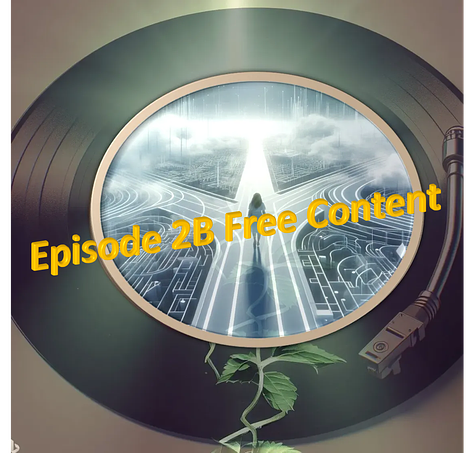
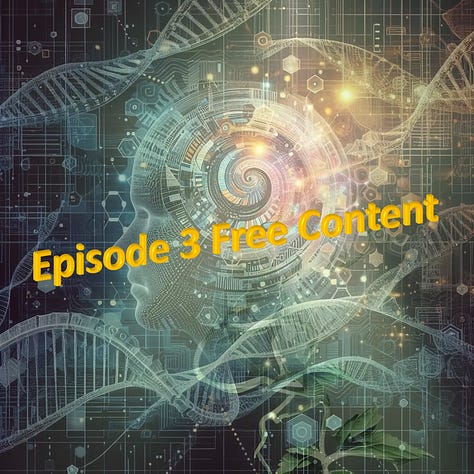
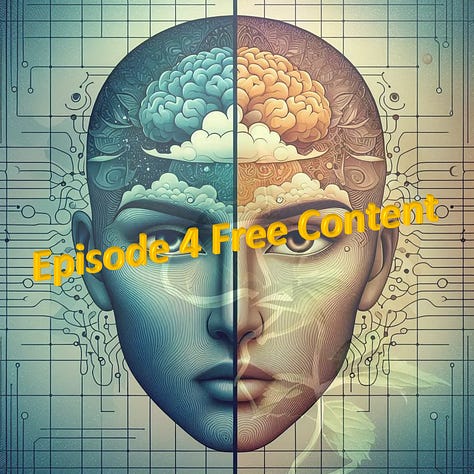
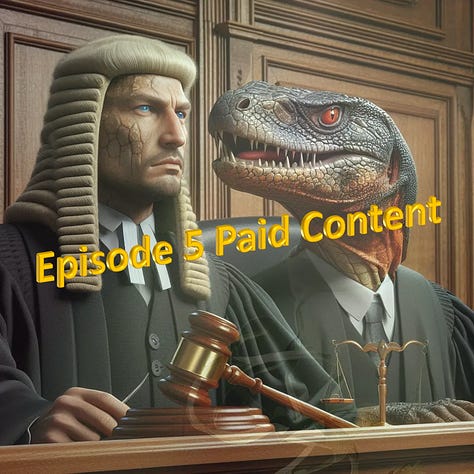
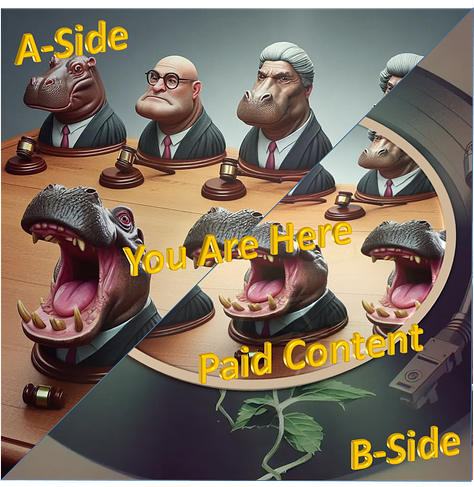
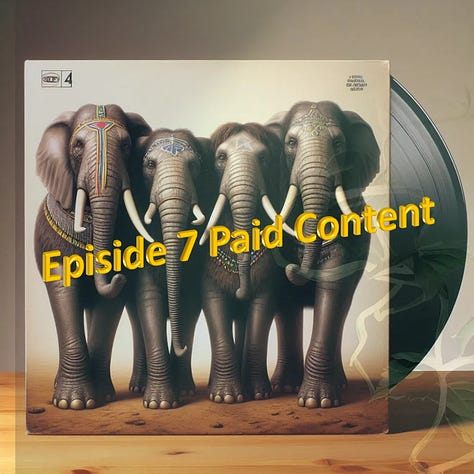
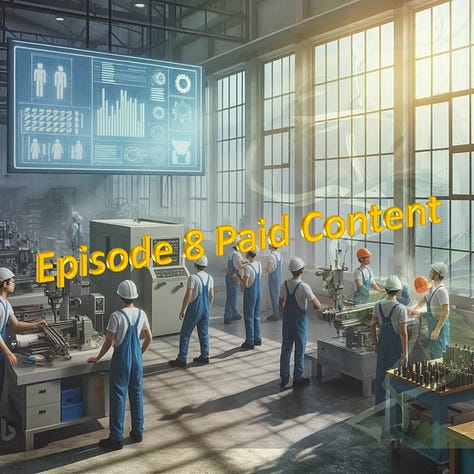
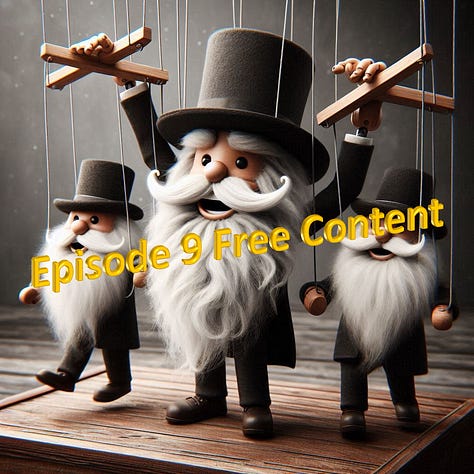
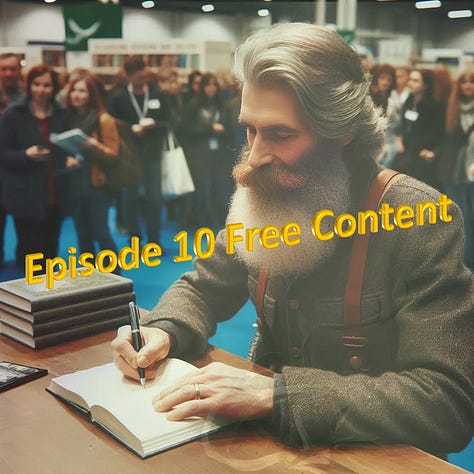
In S15, E4: The Unconscious Coupling a set of assumptions were made (reproduced below) that even ‘determinists’ are unlikely to disagree with.
Assumption #1
The ability to respond to stimuli in the environment does not require free-will
Assumption #2
The unconscious is a deterministic machine that has actionable outputs
Assumption #3
The unconscious has no internal awareness
Assumption #4
The conscious mind has no direct executive powers
I allowed myself no ghosts in the machine, but even starting with the assumption of an Unconscious Decision Maker (UDM) and a non-executive Conscious Mind (CM), was still able to present a plausible mechanism by which free-will could emerge.
I suggest that whether via reflex or free-will, the organism is a prime mover of actions, thus.
Local Definition #1: Actionable Output
Here the term ‘actionable output’ refers to anything produced by the brain or nervous system that leads to an action that has an effect on the world.
Demonstrating this definition of ‘actionable output’ in real life is not difficult, and for most people, that it exists would be too obvious to state. Of course what we are talking about is where the decision comes from and I am happy to concede there are innumerable contributory factors.
However, when a ball is kicked we must at least give the brain that happens to be connected to the foot, the credit for being somewhere in the causal chain. Whatever else we might believe about the origin of the decision to kick (or indeed whether the concepts, ‘origin’ or ‘decision’, mean anything in this case) this much must be true.
Intention/Motivation
If we are humiliated, wanting to remove ourselves from the situation is normal, but why? Does the CM feel this humiliation directly or is the discomfort something we are instructed to feel by our UDM while simultaneously making the decision to walk away? Can it really be like this?
UDM: “Here is some information that might interest you.”
CM: “That is humiliating I need to get away.”
UDM: “I have already issued an instruction to get you out of there.”
CM: “Why did you need to tell me that?”
If consciousness has no influence on decision-making what would be the use of being informed of situations beyond its control? The conscious experience would be made worse for no good reason which is absurd. Embarrassment must have a purpose within the broad category of behavioural modification.
Behavioural modification is about changing how we respond to combinations of stimuli in our environment. Surely this must mean that our conscious experience is a behavioural modifier and not merely a passive observer.
It makes more sense to suppose that embarrassment originates in consciousness and that the experience of it is also an input into the unconscious decision making process. Thus the discomfort, an indicator of social harm, is factored into the calculation of what to do next. This is consistent with my positing of a neurological feedback loop.
Neurology
So what can neurology tell us about this? Expert opinions vary and it is unwise for a layman to pick arbitrary sides out of convenience. It is a bit awkward because I am naturally suspicious of consensus and also paranoid about my own confirmation bias. With no expertise in this area I was obliged to obtain some appreciation of the scientific consensus as a starting point. This is why I looked for a meta-analysis.
It is relevant to my argument to mention that I found no instance of any neurologist claiming that emotions have no purpose. I don’t claim to prove a negative with this but by all means take it as a challenge to look for the exception yourself.
Self-conscious emotions, such as shame and guilt, play a fundamental role in regulating moral behaviour and in promoting the welfare of society.
Out of the gate this meta-analysis states that emotions play a role in behaviour modification, providing the environmental context for the decisions we make, and the actions we take.
Emotions are not in-car entertainment for a powerless conscious mind strapped in the child-seat of our meat vehicle. How we cope with emotional challenges depends on the extent to which we are equipped to navigate the constraints those emotions apply. Do they make us freeze, angry or want to run away?
Events have multiple contributory causes and it’s not a big leap to suggest that free-will or self-determinism are also ‘prime movers’. If instead, we think our preferences are illusory and that we only imagine we are making decisions, it raises the question of why our brains would go to the effort of pretending we have a choice in the first place. I agree there are evolved mechanisms for self-delusion (I talk about them in another series) but not on this occasion.
Despite their relevance, the neural bases of these emotions are uncertain.
ibid.
This is about where these emotions occur in the physical brain. This is what I was looking for and it seems the jury is out. Let’s hope they are getting lunch.
So what do we know?
In the present meta-analysis, we performed a systematic literature review in order to single out functional neuroimaging studies on healthy individuals specifically investigating the neural substrates of shame, embarrassment, and guilt.
ibid.
So this is certainly what I was looking for.
The analyses revealed that both guilt and shame/embarrassment were associated with the activation of the left anterior insula, involved in emotional awareness processing and arousal. […]
specific activations for shame/embarrassment involved areas related to social pain (dorsal anterior cingulate and thalamus) and behavioural inhibition (premotor cortex) networks. This pattern of results might reflect the distinct action tendencies associated with the two emotions.
ibid.
To clarify, the ‘two emotions’ being contrasted are not ‘shame’ and ‘embarrassment’ (which for functional reasons are assumed to be similar enough to considered together) but between ‘shame/embarrassment’ AND ‘guilt’.
So the ‘distinct action tendencies’ are on the one hand social pain, behavioural inhibition (shyness - wanting to disappear). Shame is what we feel when socially humiliated because it is tied to one’s status being diminished in the opinions of others. The left anterior insula is also linked to language and empathy so perhaps our feelings of humiliation stem from what people say (language) and how we interpret the feelings of others (empathy), in this case about us.
Guilt stems from feelings of having done wrong and this is an emotion tied to our sense of self-worth. So the first is about social standing and the second our sense of morality and how we measure up to it.
Series 15 Lookahead
July 2024 (Paid Content)
S15, E7: Mammal Mia! Here We Grow Again - the mammalian brain, social scaling and the group strategies, the neocortex and the emergence of abstraction. Thursday 11th
S15, E8: The Manufacture of Abstraction - the consciousness as prime mover. The creation of information and abstraction. Thursday 25th
August 2024 (Free Content)
S15,E9: Determined TBD - my review of Robert Sapolsky’s book “Determined: A Science of Life Without Free Will”, starts with Episode 9. Thursday 8th
S15,E10: I Bought Robert Sapolsky’s Book But It’s Not His Fault - book review continues. Thursday 22nd




